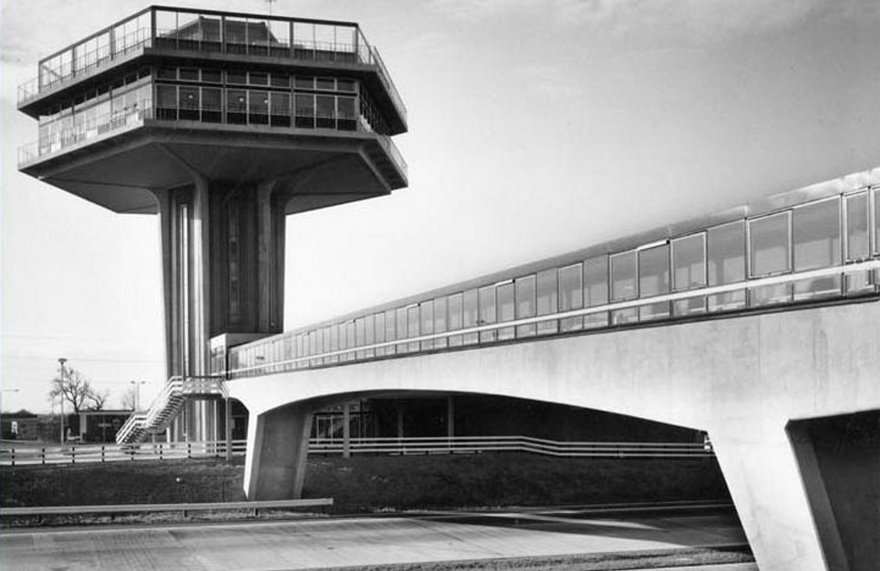Body

Aside from 'mere' functionality – the rapid transition from A to B – the motorway is also a place (a strange kind of non-place), an enduring symbol, and an overlooked component in our conception of the environment. This is the central thrust of In the Company of Ghosts: The Poetics of the Motorway, a thoughtful new book edited by Edward Chell and Andrew Taylor. Featuring a broad range of photography, poetry, essays and short stories, the collection addresses the history, symbolism and effects of these vast high-speed networks, which are also, as David Lawrence points out, “nameless places” in their own right.
Broadly speaking, the first half of the book is shaped by a single question. As Malcolm Andrews puts it:
“How do we relate to what we see of the world and its representatives from within the insulated spaces of car and motorway? To what extent has the experience of motoring and its infrastructure – so increasingly a part of our daily lives – been imperceptibly regrinding our cultural lenses over several decades, and reshaping our perception and valuation of landscape and local history?”
This forms the starting point for an outline of Modernist thought around the the first UK motorway in 1958: utopian visions of a bright, sleek permafuture – the “great bypass of history” in Andrews' words. Personal stories by the likes of John Davies butt up against a largely conceptual critique of Modernism's ad-flat images of speed and linear progress. Road signs, service stations, the passing vista: all are given the Barthes-esque treatment.
One of the most memorable contributions is that of architect Will Alsop, whose idea for a great Northern SuperCity, stretching from Liverpool to Hull is outlined here through a strange combination of bold subheadings and all-caps outpourings (“NO OVERTIME IN THE SUPERCITY”). His visionary, man-of-the-people schtick grates, but hilariously so: particularly the lovely irony in his description of fellow northerners. “They are individuals,” he declares triumphantly. Marie-Antoinette would have been proud.
Predictably Iain Sinclair pops up to battle such grandiloquence with his own allusive prose. But here his incessant championing of the local, über alles, calls to mind Tom Lehrer's wonderful description of the middle-class folk music aficionado, who equates “authenticity with merit and illiteracy with charm”.
Elsewhere, this approach to Modernism contains little that isn't already known (Edward Chell's interesting analysis of Clothoid Curves doesn't come until much later) and much of the writing is caught in the same trap as the ideology it purports to critique: overstatements of opposition between inside (clean, controlled, air-conditioned) and outside (living, wild, 'real') and between the man-made motorway (artificial, flat, a-historical, a-geographical) and the authentic, originary natural world it cuts through and across. There's a neglect of complexity here, and of the fact, for example, that, with its interplay of fields and hedgerows, the majority of the UK countryside is just as 'man-made' as it is 'natural'.
From here, Poetics of the Motorway, makes the classic postmodern move to problematise the oppositions that it itself has established. Chell makes the case for the motorway as form of enclosure (“politics is embedded in our landscape” he argues); David Lawrence discusses dogging and sex in service stations; and Stephen Daniels makes the by now well-established case for walking as somehow subversive – a slowed down “radical reverie” he calls it – and argues for a renewed exploration of their wild flower-filled edgelands. Here, Modernity is worn down – conceptually and materially – by time and use, to form what David Lawrence terms the “patina of human activity”.
Unfortunately, as Andrew Taylor observes in the poem Diamond Tea, “This is not 1990 / this is 2012”, and much of the overall tone here does feel dated. The ghosts of the title may well be seen to refer to JG Ballard whose short story Concrete Island (1974) hangs over much of the writing in this collection. This continued presence (or absence) suggests a paradoxical lack of progress over the last four decades. Stemming from this is a problem shared with deconstruction generally: aside from this book's notion of an imminent (gradual or apocalyptic) Return to Nature, there is a structural inability to think about the future in anything except the most nebulous of terms.
It's a shame. This is a fascinating project – with moments of brilliance (linguistic, historical, personal, philosophical, poetic etc) but it feels constrained by its own theoretical frameworks. These writers are not alone in that though: the question of how to move forward from the boom-fuelled, postmodernism-induced apathy of the 1990s and 2000s is one that we all must deal with in some way. Stuttering, tentative, but with purpose and principles, the future is a long way from the speeding certainties of the motorway asphalt.
In the Company of Ghosts – The Poetics of the Motorway, Ed. Edward Chell/Andrew Taylor, erbacce-press, £12.99
We would like to thank Beaconsfield, London, whose panel discussion 'Poetics of the Motorway' with Will Alsop, Edward Chell, Jennifer Cooke and David Lawrence back in July 2012 first alerted us to this fascinating book.
beaconsfield.ltd.uk

Add new comment